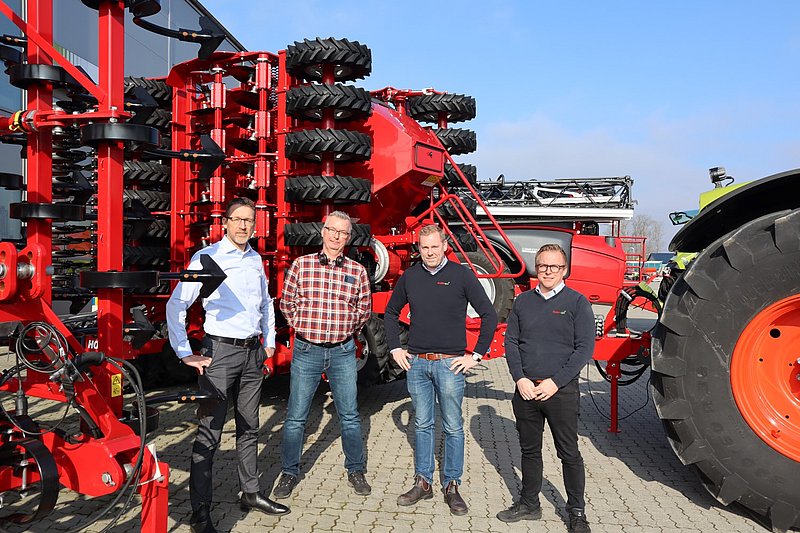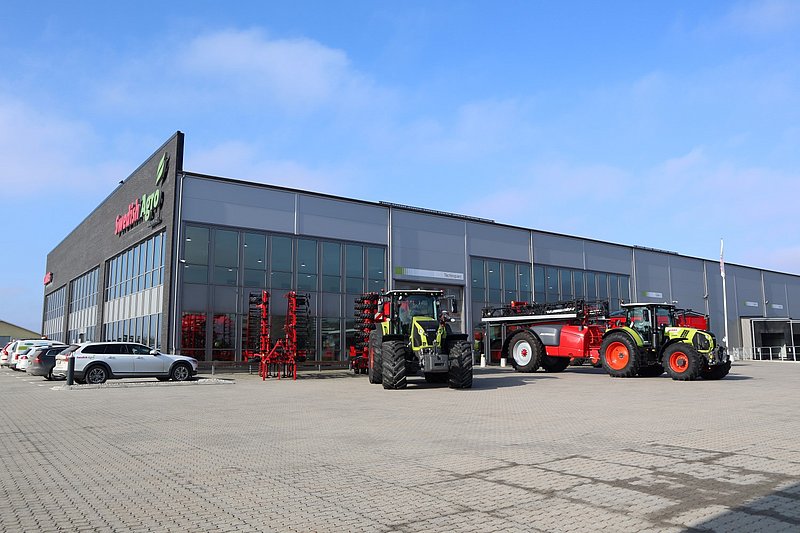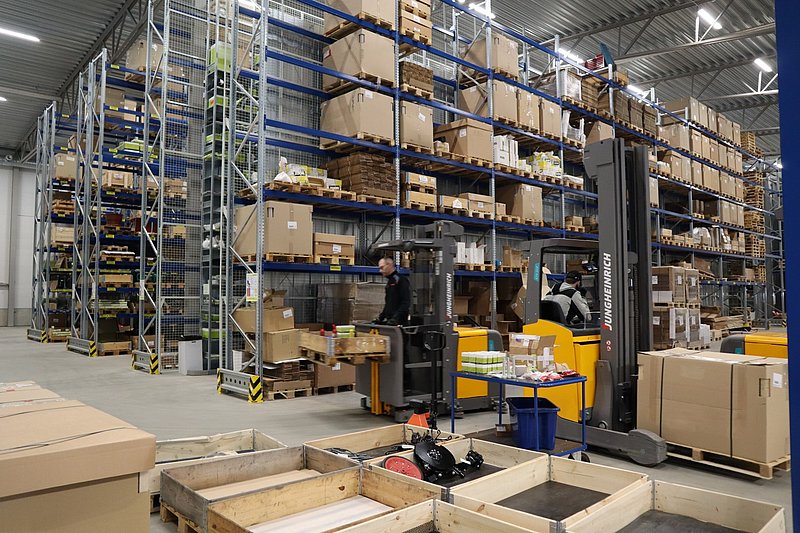Focus on HORSCH
by Anders Niléhn
With a growth rate of 20 percent a year, HORSCH has quickly become the second largest brand within Swedish Agro Machinery. The plant protection sprayers have established themselves in the Swedish market in no time at all. There also is a strong sales focus on seed drills and cultivators.
Swedish Agro Machinery has sold its hundredth HORSCH sprayer. That’s very good going, considering that the Swedish market for plant protection sprayers is not exactly enormous, and that Swedish Agro Machinery only began selling HORSCH products in June 2017.
“When farming professionals are considering investing in a new sprayer, HORSCH is always a serious contender. These days a lot of the marketing for their machines is word-of-mouth. For Swedish farmers make high demands on excellent technology,” says Hasse Ripa, CEO of Swedish Agro Machinery.
As regards HORSCH’s other products, seed drills and cultivators are now the primary focus of marketing activities to increase sales. “Our target group are professional arable farms who need highly efficient machines and make high demands on work quality. This is why our sales are greatest in the more agriculturally intensive areas of Sweden,” says Gustaf Thuresson, Product Manager Implements at Swedish Agro Machinery. About 3 million hectare – less than one tenth of the total area of Sweden – is used for farming. The most intense farming area is in Central and South Sweden. The Scania region where the company headquarters of Swedish Agro is located is the centre of the Swedish food production. Cereals – mainly barley, wheat and oats – are grown on more than 40% of the arable land. The plains of South and Central Sweden mainly produce bread wheat. Feed grain cultivation increases in the northern direction. Oilseeds mainly grow in South and Central Sweden, sugar beet only grows in the most southern parts of the country. Potatoes are grown everywhere.

From the left: Hasse Ripa, CEO, Christer Areskough, oversees service and support for the HORSCH machines, Daniel Andersson, Product Manager for HORSCH, and Gustaf Thuresson, Product Manager Implements.
This year the company will be exhibiting its implements at Borgeby Fältdagar and Brunnby Lantbrukardagar. The practical demonstrations that take place at these outdoor events are the perfect way to present the machines not only at the stand but also live in the field.
The HORSCH Roadshow, too, stopped in Sweden – and quite successfully so. 1000 visitors benefitted from the three days to see the HORSCH innovations live in the field. “The feedback was extremely positive, and we had a lot of new contacts which we are now following up,” says Daniel Andersson, HORSCH’s Product Manager at Swedish Agro Machinery. “We also run demonstrations of our own on farms and do a great deal of work through social media to inform people of our machines and what we’re doing.”

Larger working widths
“Our customers in Sweden mainly are large farms. In the seed drill sector for example we almost only sell machines with a working width from 6 m,” comments Daniel Andersson. He says that HORSCH is a good fit in the overall company structure, since it occupies a niche which doesn’t conflict with Swedish Agro Machinery’s other brands.
Swedish Ago Machinery and HORSCH have a lot in common. Both are young, both are determined to be at the cutting edge, and both have a focus on premium products.
“We completely identify with the HORSCH philosophy. We don’t deal in low-budget alternatives, since we specifically market machines to a professional clientele, and HORSCH fits this profile perfectly,” Hasse Ripa explains.
Parent company from Denmark
Swedish Agro Machinery was founded in 2016 as a direct result of the rights to market the German firm Claas becoming available. In 2012, the farming cooperative Danish Agro made plans to enter the farm machinery business, and purchased the Finnish company Hankkija the following year. Shortly afterwards it established a presence in the Czech Republic and in Poland, with a vision to establishing machine dealerships around the Baltic.
When Lantmännen Maskin stopped marketing Claas in Sweden in 2015, discussions ensued between the German machine manufacturer and Danish Agro, and a workable arrangement was soon agreed.
In 2016 Danish Agro founded farm machinery companies in the three Nordic countries Sweden, Denmark and Norway. Today Danish Agro is Claas’s single largest customer, and last year the combined turnover for farm machinery was €759 million last year, an 18 percent increase on 2020.
Things are moving on a pace in Sweden too. Swedish Agro Machinery had a turnover of 920 million SEK (about 86 million Euro) last year, an increase of 24 percent over the previous year.
The company’s headquarters in Skurup in Scania houses a large and modern parts depot. Today Swedish Agro Machinery has 150 employees, of which 97 work in the service department, 30 in sales, with the remainder filling back office roles. In addition to this Swedish Agro Machinery has 15 other facilities in strategic locations around the country, and 9 service partners.
Roughly 3 million hectares (7.5 million acres) of land are farmed in Sweden half of which is used for growing forage. The most common cereal crop is wheat, followed by barley.
In Sweden there are approximately 65,000 farms, but some of these have as few as 2 hectares (5 acres) of arable land. The number of farms from which one person can make a living is only 25,000. Sweden is a long, narrow country stretching from north to south, with greatly varying conditions for agriculture.
In the south many farms concentrate on sugar beet and other speciality crops, while forage and cereals are more common the further north one goes. Many Swedish farmers combine agriculture with forestry.
Sweden is self-sufficient in cereal crops, dairy produce and sugar. With regards to other food the situation varies enormously; for example, the country only produces 70 percent of the meat it consumes.
Size rationalisation has proceeded swiftly in Sweden over the last few decades, a process which has produced a number of very large farms within both livestock and crop production. They exist side by side with what are sometimes called hobby farms, where the owners get their main income from some other form of employment and run the farm as a side-line.
Large distances
“Sweden is a country of large distances – the extension from north to south amounts to 1572 km and to 499 km from east to west. There are large forest areas in between. Just to get an idea of the distances: The distance between Trelleborg in the south of the country to the northern end of Sweden is almost the same as the distance between Trelleborg and Naples in Italy. Moreover, the conditions vary greatly between the regions: in the cool north the vegetation period amounts to less than 120 days compared to 240 days in the most southern part of Sweden. With our big service team, we are well prepared for these conditions. We have the facilities we need, and with our mobile service units we reach our customers in the whole of Sweden,” says Hasse Ripa. “Our technicians are trained intensely by our internal training team. They are real product specialists. There are regular trainings to expand their skills and knowledge continuously.”
There were initial complaints about poor coverage, but that is no longer the case. Farmers understand that it is better if competence is concentrated to a few larger dealerships than spread out thinly over a lot of smaller ones. The level of competence at the facilities is extremely important in this day and age of technically advanced agricultural machinery, when farmers place high demands on functionality and performance.
Both Swedish Agro Machinery and HORSCH have clear objectives when it comes to providing customers with first class support and service, and the two have many different programmes in place to achieve this.
The company will continue to grow, but now completely organically. “We’re looking to employ at least another 10 service technicians and a handful of sales professionals, but currently we have all the brands we need.”
Direct line to the customer
Close customer contact is important to Swedish Agro Machinery. Internal training sessions are organized for sales personnel and technicians, but large training sessions for customers are avoided.
“We provide an intensive training to each customer on the delivery of a new machine,” explains Daniel Andersson. “Apart from that we attach great importance to the fact that our employees are trained excellently. They are a competent contact for the farmers for any questions and problems.”
HORSCH manufactures state-of-the-art machinery which relies heavily on electronics, for example the new system HorschConnect. This is technology that allows a service technician to view the screen in the tractor cab remotely in order to assist the driver.
“A lot of problems are actually operating errors which can be swiftly corrected with the right knowledge,” says Christer Areskoug, who is responsible for service and support for HORSCH machines at Swedish Agro Machinery.
This year they started a new service called HotLine. With this new service the support team at the company is on call, so that farmers can contact them and receive assistance with machine settings in the field, without technicians having to make a field call.
The drive towards larger agricultural units is an advantage for both HORSCH and Swedish Agro Machinery. HORSCH’s machinery is sophisticated and cannot be purchased online. “A basic configuration can be done via the website, which is a good thing, because it means that the customers have done their homework before they meet the salesman. There are a lot of decisions that need to be made, and the final ones have to involve the customer and the salesman working together,” explains Gustaf Thuresson. At Swedish Agro Machinery there is a conviction that HORSCH, is a brand with great potential, and that sales will continue to increase steadily, year on year.

New trends
One reason for the excellent market development is that HORSCH continues to adapt to changing conditions and emerging trends. The manufacturer for example intensely focused on hoeing and harrowing technology and has already launched two new products. There is a demand for such a technology as it is to be expected that the use of chemical plant protection agents will have to be reduced. Thus, there is an increasing interest, also in Sweden, in new solutions for weed control. And according to Swedish Agro, the sector of autonomous agricultural machines might also be interesting for the Swedish market.